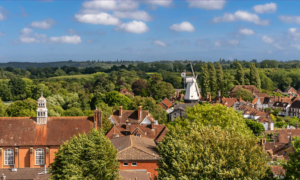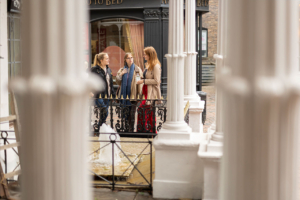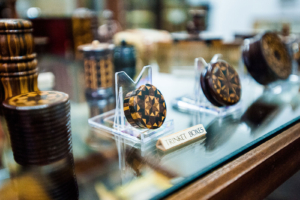The region as a whole boasts 25 areas of conservation status meaning the structures and land are protected for posterity and to be admired by many more generations.
Set amongst a rich heritage of orchards, hop farms (and hop picking), vineyards, market towns, iron production and cloth weaving, the region of Tunbridge Wells possesses a fascinating depth of heritage and history.
Experience an historic spa town break in Royal Tunbridge Wells, the only spa town in the South East of England, equidistant from London and the coast.
We think we have the benefit of town and country at its best!
A new town in the making
Northern developments of Royal Tunbridge Wells began in the early 1800’s when plans to create a new town, complete with gardens, features and services “suitable to the reception of genteel families” on the Calverley Estate.
This extensive undertaking was designed by a brilliant young architect named Decimus Burton who had made his name designing and building the innovative residential area of Regents Park. He designed and built the private residences in Calverley Park and Calverley Park Terrace. Calverley Park contains twenty-four villas overlooking 20 acres of meadow and park grounds, known today as Calverley Grounds, which are chiefly in the Italian and Grecian style.
Using local stone from the quarry on the Calverley Estate, he also remodelled and extended Calverley House, a Georgian mansion, now the Hotel Du Vin. It was here that Princess Victoria (later Queen Victoria) stayed as a young girl.
The new town springing up included villas, a terrace, a parade, rows of shops, a market place, the gothic Holy Trinity Church (now a Theatre & Arts Centre) and the Calverley Mews, which afford extensive accommodation for horses and carriages. All this was completed in 20 years “so that the residents upon this estate might enjoy the same advantages as those who lived nearer the springs.”
![Photograph_of_the_High_Street_c.1905_(2)[1]](https://visittunbridgewells.com/wp-content/uploads/2024/04/Photograph_of_the_High_Street_c.1905_21-scaled-e1712914295254.jpg)
![Postcard_of_Monson_Street_(1919)[1]](https://visittunbridgewells.com/wp-content/uploads/2024/04/Postcard_of_Monson_Street_19191-scaled-e1712914685285.jpg)
The Great Hall (1870 – 1872) at the bottom of Mount Pleasant Road, was designed by a local architect in a contemporary French style with a large hall which was to supply the demand for public rooms for cultural activities including lectures, concerts and social events. There was also a library and reading room in The Great Hall which was eventually destroyed in a mysterious fire.
The purpose built Opera House, at the top of Mount Pleasant Road, opened in 1902. Originally it was planned for the opening to coincide with the celebrations for Queen Victoria’s Diamond Jubilee. In 1931 the Opera House converted to a cinema which had to compete with the large newly built Ritz cinema, once described as “Kent’s most luxurious cinema” which opened its doors in 1934.
Today the Opera House is a popular pub; it still retains the stage and grand balconies and occasionally transforms back into an Opera House for a night or two. To see it is to hardly believe it!
Heritage Trails to do around Tunbridge Wells
Well before the town of Royal Tunbridge Wells was built up, the villages and hamlets in the countryside were securely established.
Places such as Paddock Wood, Horsmonden and Cranbrook have wonderfully colourful histories. Take a look at the tapestry of heritage on the village pages to whet your appetite before you delve into the real experience.
There are hundreds of memories of Londoners still around today who used to get the train down from the capital to Paddock Wood for their holidays to pick the hops and the apples.
Hawkhurst has its own special heritage of adventure rooted in the 18th Century. Smugglers and gangs ruled the area with the help of the locals! Follow the Smugglers’ Trail to retrace their dastardly deeds.
The churches have been at the foundation of communities in bygone times. One way to explore the area and its heritage is to follow the route in ‘On the Wealden Churches Trail’. This will provide you with a thoroughly scenic journey right across our beautiful ancient countryside. The leaflet explains much of the history and art of past times incorporated in the churches in which many a famous architect and artist have been involved.
A Heritage Walking Trail was launched in 2006 for the 400th anniversary of the Chalybeate Spring’s unearthing. This guides the visitor around some of the most iconic and important historic sights of the town of Royal Tunbridge Wells. Special commemorative claret plaques on buildings of significant historic interest can be discovered in this illuminating self-guided tour.
How to get to Tunbridge Wells
Just a short train journey from London’s Charing Cross, London Bridge or London Waterloo East and easily accessible by car from the coast and the main road routes in the South East, Royal Tunbridge Wells makes an ideal base to get away from your busy stressful lives as a holiday or a mini-break.
















